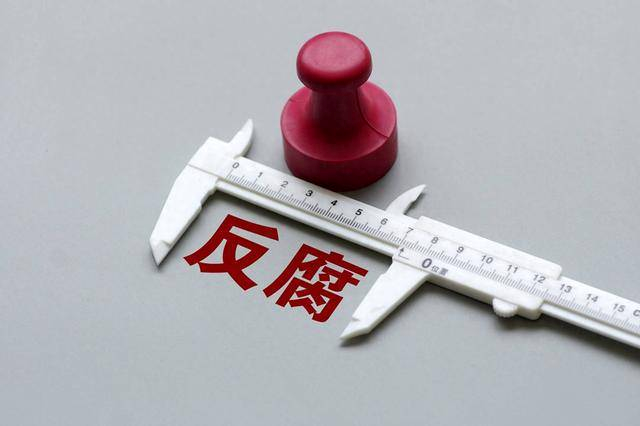The central government has clarified the criteria for identifying public officials who violate the rules on eating and drinking

Source: Central Commission for Discipline Inspection and National Supervisory Commission website, “Communist Party Member” WeChat public account Beijing News Political Affairs
The Central Committee has clarified the criteria for identifying public officials’ illegal eating and drinking, and the picture shows an anti-corruption diagram
Recently, the website of the Central Commission for Discipline Inspection and the National Supervisory Commission issued the “Central Level Deeply Implementing the Central Eight Regulations Spirit Study and Education Working Group, the General Office of the Central Commission for Discipline Inspection Publicly Reported 2 Typical Problems of Party Members and Cadres Illegal Eating and Drinking Seriously Violating the Central Eight Regulations Spirit”, which sounded the alarm for party members and cadres on the issue of illegal eating and drinking.
When family members sit together and friends gather together, there is always a table of good food, but public officials should be vigilant. Some “warm dinners” may hide “illegal traps”.
What is illegal eating and drinking?
Illegal eating and drinking refers to: accepting and providing banquets in violation of regulations, including illegally providing or accepting banquets that may affect the fair performance of official duties, accepting banquets with public funds and banquets for management and service objects, and organizing and participating in banquets paid for by public funds in violation of regulations. These are typical violations of the spirit of the Central Eight Regulations.
According to the Regulations on Disciplinary Actions of the Communist Party of China (hereinafter referred to as the Regulations), there are four main types of cases of illegal eating and drinking:
First, accepting or offering banquets that may affect the fair performance of official duties;
Second, entering and leaving private clubs for eating and drinking in violation of regulations;
Third, organizing or participating in banquets paid for with public funds in violation of regulations;
Fourth, receiving guests beyond the standard or scope or taking the opportunity to eat and drink lavishly.
What is the key to identifying illegal eating and drinking?
Based on the constituent elements of illegal eating and drinking, the key point to identifying illegal eating and drinking is to clarify the relationship between the people involved in eating and drinking, the nature of the place where the eating and drinking took place, and the source of the money for eating and drinking, that is, who to eat with, where to eat, and who pays.
Who to eat with
Party members and cadres also have lives and need to maintain relationships. It does not mean that they cannot eat with anyone. If it is a normal dinner with family members, relatives and friends, then there is no problem.
However, according to Article 101 of the Regulations, regardless of whether the meal is spent on public funds, as long as it is a banquet that may affect the fair performance of official duties, party members and cadres cannot accept it.
Subordinates, subordinate units, enterprises, management and service objects, people with these attributes, no matter what the reason, no matter where they eat, as long as they are invited by the other party, eating is a violation of discipline.
Where to eat
This is another key factor in determining whether eating and drinking in violation of regulations. In this regard, if we only judge whether it is a violation by the place of eating and drinking, then we need to pay attention to one place: private clubs or places with the nature of private clubs.
As long as it is such a place, no matter who you eat with, no matter who pays, no matter whether it affects the performance of official duties, it is a violation.
Who pays
This is the most critical factor in determining the problem of eating and drinking in violation of regulations, and it is also the factor with the most types of violations. Generally, there are two situations for the determination of violations:
One is to eat and drink in the name of official activities. That is, under the name of official activities, there is no real official activity, and public funds are used to pay for eating and drinking.
The second is that the real official business exceeds the limit. That is, although it is indeed an official activity, the reception is “justified”, but it exceeds the standard and scope, or takes the opportunity to eat and drink. For example, if you were supposed to host 2 people but wanted to eat better, you could fake the reception and host 4 people, using the meal standard for 4 people to host 2 people.
The Central Commission for Discipline Inspection reminds: Don’t go to these 8 kinds of dinners
Don’t attend public banquets
Interpretation: Official receptions must be frugal, oppose extravagance and waste, and strictly control the scope and standards of reception. Public receptions that exceed the scope and standards should be considered public banquets.
Don’t accept meals arranged by companies
Interpretation: When you go to a company to carry out official activities, you must not accept reception arrangements or even banquets. If you really need the other party to assist in arranging, you should pay for the meal yourself.
Don’t go to the company to eat and drink in disguise
Interpretation: Official meals should be arranged at the company’s internal reception venues or restaurants purchased by the government. Don’t use the company’s reception venues for disguised eating and drinking. Don’t participate in banquets organized by companies, and don’t ask companies to pay for banquets for companies or individuals.
Do not accept invitations to meals arranged by the management and service objects
Explanation: Invitations to meals arranged by the parties, requesters, interested parties and management and service objects should be rejected. For other dinners where the situation of the invitees, the motives for the invitations and the scope of the invitations are unclear, you should also consciously avoid them.
Do not accept invitations to meals that may affect the execution of official duties
Explanation: During the execution of specific official duties, except for normal official receptions, all other invitations that may affect normal official activities should be rejected, and you must not take the opportunity to eat and drink lavishly.
Do not use public funds to entertain private guests
Explanation: The objects of official reception refer to those who come to the unit to attend meetings, conduct inspections and investigations, perform tasks, study and exchange, inspect and guide, and report on work. Official receptions shall be arranged according to regulations. No official receptions shall be arranged for those other than the above objects.
Do not participate in grand wedding and funeral banquets
Explanation: Weddings, funerals and other celebrations should be simple and simple to prevent extravagance and extravagance. Do not blindly support others at weddings, funerals, or other celebrations, and consciously avoid them.
Do not attend banquets with the purpose of collecting money
Explanation: Taking advantage of the opportunity of hosting various banquets to accept gifts from people with whom you have no normal personal connections is a violation of the provisions of integrity and self-discipline. Public officials should neither host nor attend such banquets with the purpose of collecting money.
Public officials should still be vigilant about the following 12 types of banquets
Do not invite each other to dinner
Explanation: If it is indeed due to official activities that require reception arrangements by superiors or subordinates, the dispatching unit shall issue an official letter to the receiving unit, and the receiving unit may arrange a working meal once, and strictly control the number of people accompanying the meal. Other mutual banquets without substantive official activities should not be arranged between superiors and subordinates.
Do not arrange official meals between people in the same city
Explanation: For official activities between departments in the city or the same county (district), individuals should arrange meals on their own, and they may neither use the public funds of their own units to pay for the bills nor accept public funds for receptions.
Not allowed to accept invitations to meals from grassroots units
Explanation: When conducting official activities at grassroots units such as townships, if reception arrangements are indeed required, in principle, meals should be eaten in the internal canteens of the township “clean government kitchen” and other units, and the grassroots units should not arrange banquets.
Not allowed to accept receptions in other places
Explanation: When conducting official activities outside the jurisdiction, meals should be arranged by yourself in accordance with the relevant regulations on official business trips. If it is indeed impossible to arrange meals by yourself due to limited conditions, the other party can arrange them according to the official reception standards after issuing an official letter, but you may not accept banquets in other places outside the official activity area.
Not allowed to accept invitations to meals arranged by village-level organizations
Explanation: When conducting official activities at village-level organizations, in principle, you should arrange meals by yourself, and you may not accept reception arrangements or even banquets; if you really need the other party’s assistance in arranging, you should pay for the meals yourself.
It is not allowed to use public funds to entertain guests during official business trips
Explanation: When attending meetings, inspections, study and training activities, relevant disciplines should be strictly observed, and it is not allowed to take the opportunity to entertain each other; it is not allowed to use public funds to eat and drink, and it is not allowed to use public funds to reimburse meal expenses that should be paid by oneself.
It is not allowed to participate in night snacks with the nature of official receptions
Explanation: Night snacks shall not be arranged for official receptions. Night snack expenses incurred for any reason shall be paid by individuals and cannot be reimbursed with public funds.
It is not allowed to entertain private guests in internal reception venues
Explanation: The internal reception venues of the unit must be used for normal official receptions of the unit, and shall not be used to entertain private guests of cadres and employees of the unit, nor shall they be lent to personnel from external units to entertain private guests.
It is not allowed to eat and drink in disguise in internal reception venues
Explanation: It is not allowed to build, renovate, expand or over-standard renovate and decorate the internal reception venues of the unit under any name. At the same time, the internal reception venues must strictly follow the standards of official receptions, and it is not allowed to eat and drink in disguise.
It is not allowed to attend banquets arranged in private clubs or high-consumption entertainment venues
Explanation: Private or corporate clubs and high-consumption dining venues shall not be used for official receptions. Public officials shall not enter and exit private clubs, let alone arrange banquets or participate in banquets arranged by others in private clubs and high-consumption entertainment venues.
It is not allowed to attend alumni reunions and hometown reunions that violate regulations
Explanation: Private gatherings should also pay attention to the participants. In addition to normal personal receptions such as guest visits and friends’ gatherings, other dinners held in the name of alumni reunions and hometown reunions that are obviously small circle in nature should be clearly refused or consciously avoided, and power should not be used for personal gain or public funds should not be used to pay for bills.
It is not allowed to attend other banquets that violate regulations and damage the image
Explanation: Dinner gatherings must comply with party discipline and regulations, distinguish between time and place; they must also respect some local customs and habits and pay attention to social impact. For some dinners that obviously violate discipline and regulations, violate public order and good customs, and may damage the image of party members and cadres, they should be consciously avoided.
Relevant Party Discipline and Regulations
“Regulations on Disciplinary Actions of the Communist Party of China”
(Revised in 2023)
Article 82 Party member leading cadres who violate relevant regulations and organize or participate in spontaneous hometown associations, alumni associations, comrades-in-arms associations, etc., shall be given a warning, a serious warning, or be removed from their party posts if the circumstances are serious.
Article 100 If a party member uses his power or the influence of his position to organize weddings, funerals, and other celebrations, causing adverse effects, he shall be given a warning or a serious warning; if the circumstances are serious, he shall be removed from his party posts; if he takes the opportunity to make money or has other acts that infringe on the interests of the state, the collective, and the people, he shall be given a heavier or aggravated punishment, up to and including expulsion from the party.
Article 101 If a party member accepts or provides banquets or travel, fitness, entertainment, and other activities that may affect the impartial performance of official duties, he shall be given a warning or a serious warning if the circumstances are serious; if the circumstances are serious, he shall be removed from his party posts or be placed on probation within the party.
Article 113: If anyone violates relevant regulations by organizing or participating in banquets, entertainment, or fitness activities paid for with public funds, or by using public funds to purchase, present, or distribute gifts, consumer cards (vouchers), etc., the direct responsible persons and the responsible leaders shall be given a warning or a serious warning if the circumstances are relatively minor; if the circumstances are relatively serious, they shall be given a removal from their party posts or a probationary period; if the circumstances are serious, they shall be expelled from the party.
Article 116: If anyone violates the reception management regulations by providing receptions beyond the standard or scope, or taking the opportunity to eat and drink lavishly, the direct responsible persons and the responsible leaders shall be given a warning or a serious warning if the circumstances are relatively serious; if the circumstances are serious, they shall be given a removal from their party posts.
Law of the People’s Republic of China on Administrative Disciplinary Measures for Public Officials
Article 34: If anyone accepts gifts, gifts, securities, or other property that may affect the fair exercise of public power, he shall be given a warning, a demerit, or a serious demerit; if the circumstances are relatively serious, he shall be demoted or dismissed; if the circumstances are serious, he shall be expelled.
Giving gifts, gifts, securities and other property that may affect the fair exercise of public power to public officials and their specific relatives, or accepting or providing banquets, travel, fitness, entertainment and other activities that may affect the fair exercise of public power, if the circumstances are serious, warnings, demerits or serious demerits shall be given; if the circumstances are serious, demotion or dismissal shall be given.
Article 35 If any of the following acts is committed, warnings, demerits or serious demerits shall be given if the circumstances are serious; if the circumstances are serious, demotion or dismissal shall be given:
(i) Setting or issuing salaries or allowances, subsidies or bonuses in violation of regulations;
(ii) Violating regulations and exceeding standards and scope in official receptions, official transportation, conference activities, office space and other work and life guarantees;
(iii) Violating regulations on public spending.







